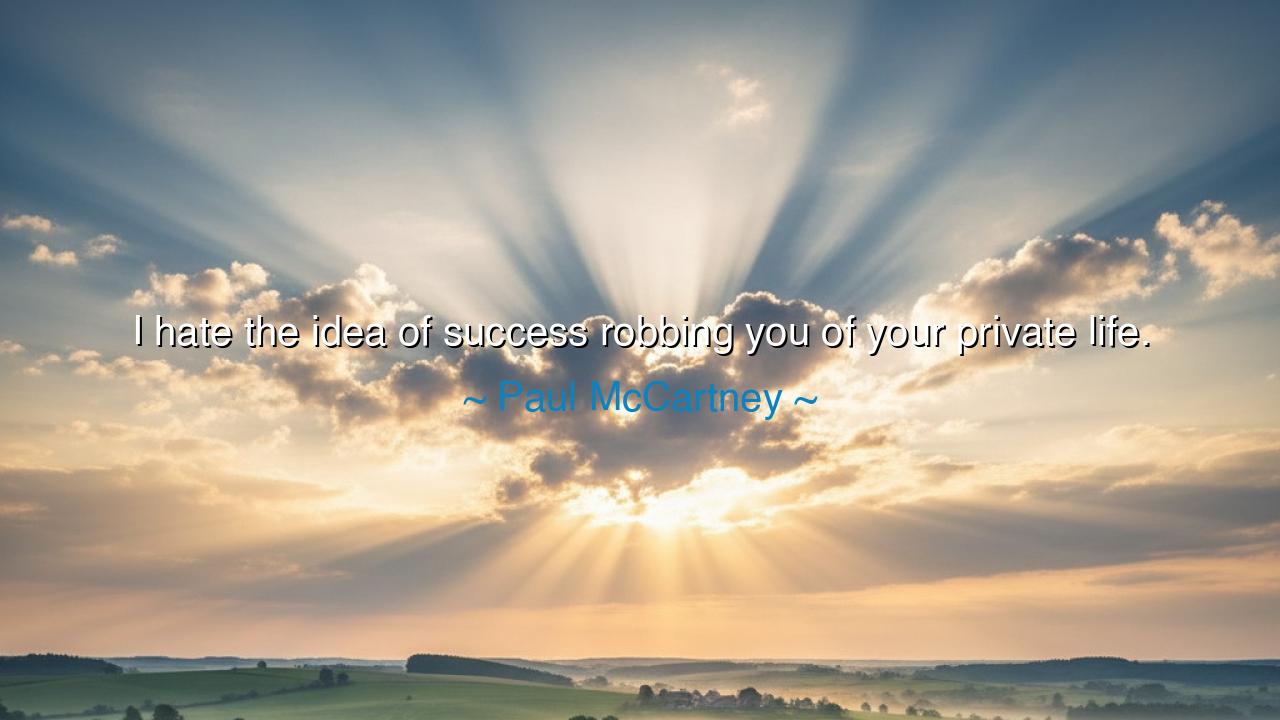
I hate the idea of success robbing you of your private life.






Hear the voice of Paul McCartney, who once declared: “I hate the idea of success robbing you of your private life.” In these words lies the lament of one who has stood at the very pinnacle of fame, who has seen the world bow before his songs, and yet who knows the hidden cost of such triumph. For success, though desired by all, can be a thief; it promises crowns of glory but reaches into the quiet sanctuaries of the heart and takes from a man the simple joys of living unseen, unjudged, and unchained.
What McCartney names is the eternal tension between the public and the private. Success makes a man visible; it thrusts him into the eyes of millions. Every word is weighed, every action watched, every step followed. What once belonged only to himself and his loved ones becomes the possession of the crowd. To be great in the eyes of the world may mean to lose the sacred stillness in which the soul breathes freely. This is the danger hidden in triumph: that the price of fame is the poverty of intimacy.
Consider the story of the great general Alexander the Great. He conquered nations and etched his name into history, but his every act was consumed by the demands of empire. Did he ever know rest, or the comfort of a private walk among his people? His glory was eternal, but his private life was lost to the endless hunger of conquest. And so McCartney, though not a conqueror of lands but of melodies, speaks the same truth: success can enslave as easily as it can liberate.
Yet history offers the opposite image in the life of Cincinnatus, the Roman farmer called forth to lead his people in battle. He achieved victory and was offered power, yet when the triumph was complete, he returned to his plow, preferring the quiet of his fields over the endless burden of public glory. His story endures because it reveals the wisdom of balance: to embrace duty without surrendering the soul’s need for simplicity. In this, we find a mirror for McCartney’s cry—that greatness must never wholly rob a man of the right to live quietly and freely.
The meaning is clear: success without balance becomes a prison. Wealth, fame, recognition—these are sweet fruits, but if they consume the whole of a man, they become bitter. To preserve the private life is to guard the heart’s inner sanctuary, the place where love, family, friendship, and solitude dwell. Without it, even the greatest triumphs lose their savor, for they lack the grounding of simple, hidden joys.
The lesson for us all is urgent: do not allow your ambitions, however noble, to strip you of the life that is yours alone. Cherish your relationships, your solitude, your inner peace, for these are treasures greater than applause. Strive, yes—but let your striving be guided by wisdom, so that success serves your life rather than steals it.
Practical actions lie before us. Set boundaries around your work and fame, however large or small. Guard time with family and friends as fiercely as you guard time with your labor. Take moments of solitude, away from the gaze of the world, to remember who you are apart from titles and triumphs. And above all, remind yourself that the measure of your life is not only in what you achieve, but in how deeply you live in the unseen spaces of love and rest.
Thus, let McCartney’s words echo as a warning and a guide: “I hate the idea of success robbing you of your private life.” For true greatness is not found in applause alone, but in harmony between the outer crown of achievement and the inner sanctuary of peace. To keep both is wisdom; to lose the latter for the sake of the former is folly. Let this be passed down as teaching: seek greatness, but never at the cost of your soul’s quiet home.






AAdministratorAdministrator
Welcome, honored guests. Please leave a comment, we will respond soon